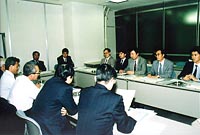Official Development Assistance (ODA)
16. Promoting Participatory Development: Financing for NGO-led Activities
One advantage of assistance ventures led by NGOs and local governments in developing countries is their allowance for more interchange and fine-tuning of the assistance provided. The Japanese government has been crafting ODA-backed measures to support grassroots-level ventures of this kind.
1. Collaboration with NGOs
Subsidy system for NGO projects (since FY 1989): By expanding the volume of assistance, the government provided subsidies of ¥817 million in total in FY 1996.
International volunteer cooperation support system: It is used to subsidize the premiums international volunteers pay for insurance against accidents or injuries abroad.
The NGOs - MoFA Quarterly Meeting: It was inaugurated in April 1996 for the purpose of exchanging views and opinions on collaboration between the government and NGOs active in the aid field.
2. Collaboration with local governments
Local-government subsidy system: It has been put into effect to help finance local-government-led technical training programs in Japan and assignments of specialists overseas.
Japan-China Comprehensive Forum on Environmental Cooperation: It allows local governments, among others, to participate actively in policy dialogues.
3. The Japan Overseas Cooperation Volunteer program
The Japan Overseas Cooperation Volunteer program was set up with the objective of placing Japanese volunteers between the ages of 20 and 39 on assignments in developing countries, and having them work closely with local citizens and assist in local programs for economic and social advancement. To date, 17,346 JOCVs have been deployed abroad under this program.

JOCV team member Matsuda teaches first graders at an elementary school in the Dominican Republic.

An NGO-Ministry of Foreign Affairs Conference inprogress.
Chart 12 Collaboration between Ministry of Foreign Affairs and Local Governments
